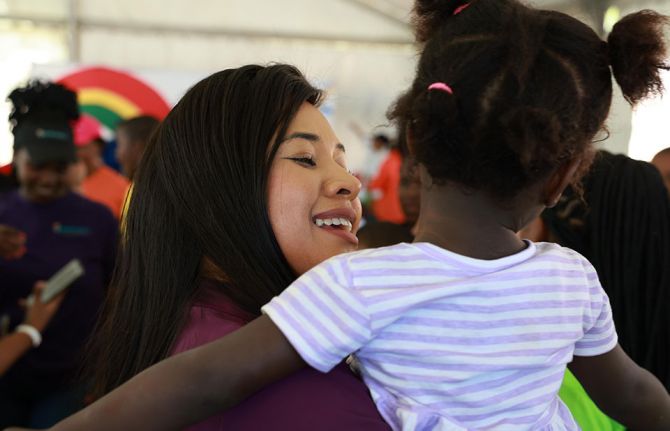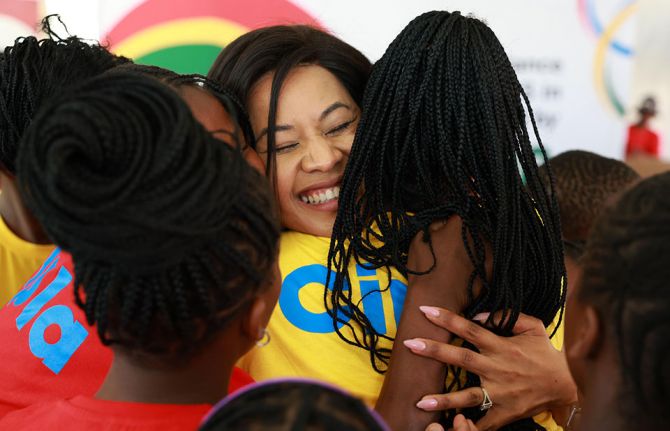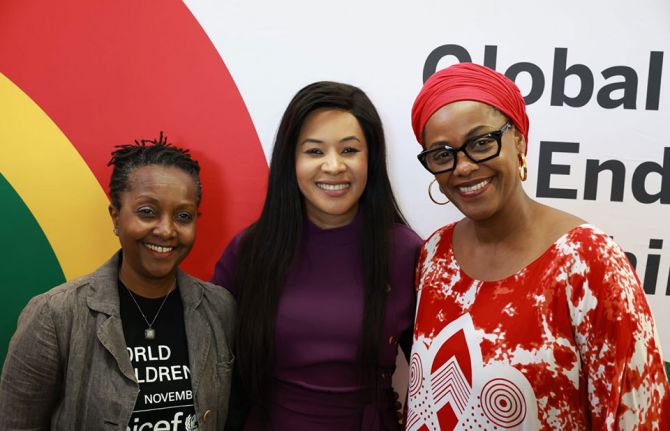



Feature Story
Efforts to end AIDS in children receive major boost with the launch of the first provincial chapter of the Global Alliance in Eastern Cape Province, South Africa
23 December 2024
23 December 2024 23 December 2024South Africa’s fight to end AIDS in children has received a major boost with the launch of the first provincial Global Alliance chapter in the Eastern Cape province. The Global Alliance is driving a global agenda to end AIDS in children by 2030 together with UNAIDS, the Joint United Nations Programme responsible for the global HIV and AIDS response, with a commitment to ensure that all children who are already living with HIV are on lifesaving treatment to live long and healthy lives and to prevent new HIV infections in newborns.
South Africa has one of the highest number of people living with HIV in the world, with approximately 7,7 million people living with HIV and about 150,000 children below 15 years living with HIV. The Eastern Cape province accounted for 24,856 children (aged 0-14 years) living with HIV in 2023. Of these, 1,360 children were newly infected with HIV during the same period. There were 255 children who died of AIDS-related illnesses during the same period.
The Eastern Cape provincial chapter of the Global Alliance was launched at the Masizakhe Children’s home in Mdantsane on 30 November 2024 by the spouse of the Deputy President of South Africa, who is also the patron of the Global Alliance, Mrs Humile Mashatile. She said that it was crucial for the country to accelerate the fight against AIDS to end the AIDS epidemic, including vertical transmission of HIV – for breastfeeding mothers who are living with HIV – and ensuring that people who are not receiving antiretroviral treatment are initiated on it. The patron further called on the government and stakeholders to support the Global Alliance’s work in the province, including ensuring that no child who needs treatment is left behind, including children in remote areas of the country where access to health facilities is often difficult.
“While the Global Alliance activities are focused on health facilities, their success requires the collective effort of all sectors. I call upon all managers across all government departments, civil society leaders and the community-led organizations to adopt these shared values. This should be carried out with an understanding that it is about children’s future,” said Mrs Mashatile. “As we officially launch the Eastern Cape Chapter of the Global Alliance, let us work together to end AIDS in children who will grow up to be healthy and smart leaders of the future.”
Mrs Mashatile also urged leaders to tackle inequalities, including transactional relationships and “ukuthwala”, the practice that involves forced marriage of young girls to older men, as some of the issues that are fuelling new HIV infections in children. Deputy President Paul Mashatile led the pledge against gender-based violence during the national World AIDS Day commemoration event in Mdantsane on 1 December.
The United Nations Children’s Fund (UNICEF) Representative in South Africa, Christine Muhigana, said that progress to end AIDS in children in South Africa needs to be fast-tracked.
“As we conclude the commemoration of 30 years of democracy, we acknowledge the remarkable strides of this country in addressing the AIDS pandemic with South Africa implementing the largest HIV programme in the world," said Christine Muhigana, UNICEF Representative in South Africa.
Eastern Cape Premier, Oscar Mabuyane affirmed the provincial government’s support for the Global Alliance Chapter launch in the province. He said that the province was committed to ending AIDS by 2030 as a public health threat.
“The Global Alliance Eastern Cape chapter envisions a future where every child grows free from HIV with equal opportunities by scaling up evidence-based interventions and community engagement leveraging the multisectoral responses and commitment,” said Oscar Mabuyane, Eastern Cape Premier. “Eastern Cape seeks to halt new HIV transmissions by 2030.”
Globally, UNAIDS reported that the AIDS epidemic is at a crossroads. According to Eva Kiwango, UNAIDS Country Director for South Africa, it is “important to prioritize the right to health of children living with HIV by ensuring that they receive the lifesaving antiretroviral treatment to end AIDS as a public health threat.”
Efforts to end AIDS in children combine the work of both government, civil society, community-led organizations and pharmaceutical firms that produce HIV treatment. According to Simo Masondo, Head of Government Affairs and Trade Development at multinational pharmaceutical company, CIPLA, the firm would continue to work with the government of South Africa to end AIDS through the production of antiretroviral treatment, including treatment for children. Masondo said that CIPLA was committed to equitable access of treatment for all.
